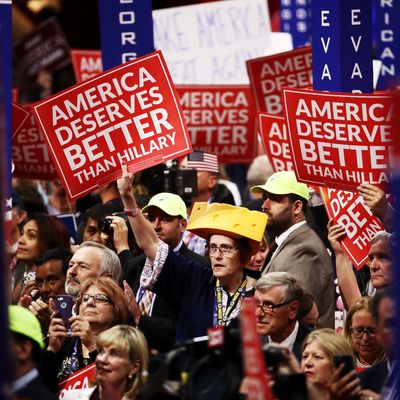
When Donald Trump picked the Mulan-hating, Titanic-loving gubernatorial goober Mike Pence to be his vice-presidential pick, he said that it was about “party unity.” And indeed, as the flopping of the Never Trump movement at the Republican National Convention shows, the GOP has indeed rallied around Trump — why else would Ted Cruz get booed offstage for withholding his endorsement?
It’s a fascinating display of what political psychologists have come to call “shared reality theory.” Similar to how some people need certainty more than others, researchers have found that people are more or less motivated to get their beliefs reconfirmed by the people around them. Sharing reality functions as “a sort of social glue,” University of Illinois at Urbana-Champaign psychologist Chadly Stern and Stanford University researcher Robb Willer write in a new column for the Washington Post, “without which we would be unable to communicate, work in teams and achieve shared goals.” When you have a strong sense of shared reality, it helps you to come to think that your “beliefs reflect objective reality” and that they’re shared by your friends and family.
As you may surmise by the way fans of right-wing commentator Rush Limbaugh refer to themselves as “dittoheads,” studies indicate that conservative people have a higher need for “shared reality.” Liberals, on the other hand, tend toward the opposite — rather than wanting to share the same reality with their kin, they’re more motivated to be unique, agreeing with statements like “in group activities, I’m somewhat of a nonconformist,” while conservatives are more likely to agree that it’s important to them to “see the world in a similar way” as others do. And in matters both political (abortion) and nonpolitical (coffee) conservatives are more likely to overestimate how much their beliefs match those of their fellow conservatives, while liberals underestimate how much their beliefs are like other liberals. And guess what: According to Stern’s research, people who report that they think their peers share their beliefs with them are more likely to vote.
Therein lies the difficulty of organizing liberals, which Stern and Willer compare to the “proverbial herding of cats” in their Post column. The liberal impulse to nonconformity may be what drives social progress — but it also makes it harder for the party to unify, the Democratic Party, to be precise. It’s a fascinating irony: Liberals might be theoretically more collectivist, pushing for policy that benefits the public good, but their individualism makes it harder to build a coalition. Just ask your nearest Bernie bro.




